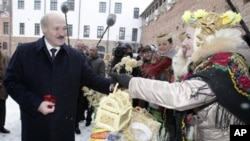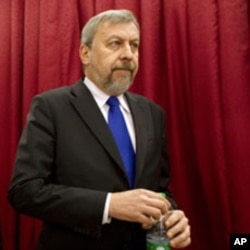Belarus votes for president on Sunday. The suspense is largely over the margin of victory for Alexander Lukashenko, hailed by some as Europe's longest serving president, reviled by others as Europe's "last dictator."
This TV ad urging people to vote is a rare reminder that Belarussians elect a president to a new five year term on Sunday. There are no election posters, no sound trucks, and only a handful of rallies. This is Minsk, a city where streets carry the names of Marx, Engels and Lenin. The secret service still proudly calls itself the KGB.
The leading presidential candidate is Alexander Lukashenko, who has ruled this former Soviet Republic since 1994. To defenders, this burly former collective farm manager is a wily nationalist who now holds the crown of Europe's longest serving president. To his critics, he is Europe's 'last dictator." And his tidy law and order country is a Soviet theme park.
'Absolute lawlessness'
Andrei Sannikov, a former deputy foreign minister, is one of nine opposition candidates competing in the election. Tragedy marred his campaign when his press spokesman was found hung in his dacha. Sannikov sees this death as part of a wider lawlessness.
"It is a system where people have no choice, said Sannikov. "They cannot choose any government, be it central government or local government. There is absolute lawlessness in the country. That is what I hear at every meeting."
The mysterious death was an exception in a campaign where legal curbs replaced the violence of the last election, in 2006. This time, candidates were allowed to hold public meetings and even two "live" televised debates.
Media coverage
But advertising was limited. Candidates were not allowed to spend more than $62,000. In this country of 9.5 million, that is less than one penny per voter. Candidate Yaroslav Romanchuk says state controlled TV and radio lined up behind President Lukashenko.
"Ninety percent of all the coverage of political events in Belarus counted by The Association of Journalists was connected to coverage of Mr. Lukashenko, and only 10 percent for all candidates, and predominantly in a very negative light," said the candidate.
'Buying the election'
Romanchuk, an economist, charged that the president is trying to 'buy' the election.
After the election was called, the president raised state salaries by one third. This year, the money in circulation has increased by 50 percent. The national debt has increased five fold. With 3,000 Belarusian rubles buying only $1, Belarus has only enough hard currency in the bank to pay for two months of imports.
The bills will be tough to pay. Russia's Prime Minister Vladimir Putin estimates that Russia has given Belarus $50 billion in subsidies since it gained independence from the Soviet Union almost 20 years ago. Now, Russia is raising gas prices to market levels and is cutting supplies of discounted oil. Overall, Russia is cutting its annual subsidies to Belarus by three quarters.
Independent foreign affairs expert Aliaksandr Tsikhamirau, predicts that Lukashenko will win the election, then adjust the economy slowly, to avoid a shock.
Tsikimarau added that tension with Russia boiled into a feud this year.
'Mafia godfather'
Russian state TV aired a documentary calling Lukashenko a mafia godfather.
In Minsk, Molotov cocktails went off outside the Russian Embassy. President Lukashenko courted the Kremlin's archenemy, Georgia. To diversify from Russia, Lukashenko visited China and Venezuela. Venezuela's president Hugo Chavez visited here a few weeks ago and promised to supply Belarus with enough oil for "200 years."
Kremlin analysts say Russia toyed with funding an opposition candidate. Then it backed off challenging the Lukashenko political machine. The Kremlin views Belarus and neighboring Ukraine as key buffer states between Russia and NATO and between Russia and European Union.
"That is out tragedy. Russia might see us as a buffer state. And the European Union, first of all Poland, might see us as buffer state against Russia. I don't need it. I don't need frontiers, dividing lines," said opposition candidate Andrei Sannikov.
Last week Russia and Belarus reconciled after what Lukashenko called a 'lovers quarrel.'
Belarus' president then refocused on winning a fourth term. Not content with appointing over 99 percent of the 70,000 official poll watchers, President Lukashenko went on national television Friday to urge voting station directors to call the police if they feel that the 1,000 foreign election observers here are being too nosy.
Standing flanked by two medieval suits of armor, Belarus' strongman did not have to remind the opposition that they face obstacles to protesting Sunday's voting. The election takes place on virtually the shortest day of the year. City officials have turned a traditional rallying place, October square, into a skating rink. Protesters face the prospect of demonstrating in the winter dark, on a vast sheet of black ice.





